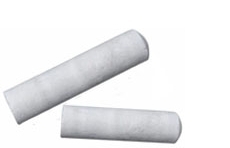![]()

My primary goal as a teacher is to provide students with problem solving skills that can be applied to nonchemical as well as chemical problems. While a firm grounding in the fundamental facts and principles of chemistry is essential, learning to question and reason analytically are the keys to mastering this subject and many others.
I view teaching science as not merely an exercise in providing facts, but also as an opportunity to provide tools. By emphasizing the connections between facts - underlying patterns, principles, theories, and models - I attempt to provide students with a means to both rationalize unfamiliar observations and to predict previously unobserved phenomena - the very things that scientists do when they do science.
My goal is not to encourage students to memorize facts, but rather to encourage students to become problem solvers. Consequently, I try to discuss in my lectures how scientists interpret their data, and I create assignments and examinations that require the application of key principles and problem solving strategies to data and chemical systems analogous to those covered explicitly in class. To me, a key measure of my success as a teacher of chemistry is how well my students can attack a problem that concerns a particular chemical system that they have not seen explicitly before.
I also firmly believe that teaching is not and cannot be confined to delivering lectures and writing exams. Actions in and out of the classroom often say more than words delivered from the blackboard - conveying respect for students and the course material is essential to conveying knowledge. I always try to keep in mind the fact that I am not only a lecturer, but I am also an example of a practicing scientist.
If you find yourself in need of an uplifting story about the power of teaching, I recommend Liu Cixun's The Village Teacher.
"It's all about the fat chalk."

